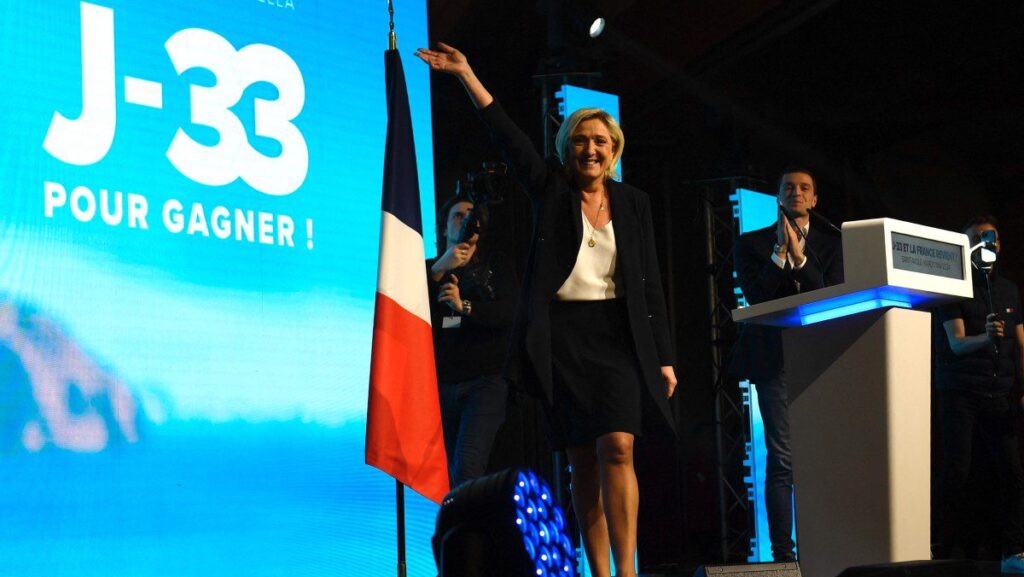
President of the French Rassemblement National (RN) parliamentary group Marine Le Pen greets supporters, next to party president and RN leading candidate for the EU parliamentary elections Jordan Bardella (R), during a public meeting in Saint-Avold, northeastern France, on May 7, 2024.
Photo: Jean-Christophe VERHAEGEN / AFP
Poll after poll shows French president Emmanuel Macron’s Renaissance party list in trouble, far behind the right-wing Rassemblement National (RN) list for the EU elections. In order to appear in a favourable position once again, the president has raised the possibility of organising a debate with Marine Le Pen, the heir to the leadership of the Rassemblement National after her father, and the party’s leader for ten years—a confrontation that has in the past always turned to his advantage.
With less than a month to go to the polls, Macron’s globalist Europhile Renaissance party list, led by Valérie Hayer, is struggling to surpass the 16-17% mark in the polls, while the national Right list led by Jordan Bardella is well ahead at around 30%. The efforts made by the presidential camp are clearly not bearing fruit. The head of the list, Valérie Hayer, is suffering from a popularity deficit. Little identified by the French, she has not been convincing during her recent televised appearances, where her lack of dynamism and charisma has been criticised. A duel between Bardella and Hayer, broadcast on television on Thursday, May 2nd, was clearly to Hayer’s disadvantage in the unanimous opinion of commentators on French politics.
In an attempt to ward off fate, Macron’s entourage put a radical solution on the table: the organisation of a duel between the president and his former opponent in the 2017 and 2022 presidential elections, Marine Le Pen. Marine Le Pen no longer heads the Rassemblement National party, which is now headed by the 28-year-old Jordan Bardella. She does, however, hold the key position of leader of the RN parliamentary group in the national assembly, and is presenting herself as her camp’s natural candidate for the 2027 presidential elections.
The possibility of a debate between the two personalities was raised in the columns of two major newspapers, Le Parisien and La Tribune Dimanche. The Élysée Palace did not deny the possibility: “Everything remains open as to how the president of the republic will be involved in this campaign. When it comes to talking about Europe and France, we can always count on the head of state.”
For her part, Marine Le Pen says she has not yet been approached by the president’s cabinet. But she remains open to the possibility of such a face-to-face meeting. However, there is no question of accepting a timetable imposed by the Élysée Palace: “If Emmanuel Macron were to suggest it, I wouldn’t rule out taking part on principle. But above all I would propose a debate after the European elections, in September, to find out where he is taking us, what he intends to do with the last three years,” Le Pen told BFM TV.
The former RN president’s response is not insignificant. The two debates that pitted her against Emmanuel Macron in both 2017 and 2022 were scathing failures. Not only did Macron win the presidential match twice in a row but, regardless of the final outcome of the vote, Le Pen was twice judged unconvincing in such an exercise by voters and political commentators alike—as if the confrontation with Macron had revealed her fundamental unsuitability for the presidential office.
Macron therefore knows very well what he is doing by proposing to replay the match in a context where his camp is losing ground: he hopes to prove, once again, that the Rassemblement National, despite its growing popularity, is not worthy of power. He wants to provide his own proof of the repeated accusations against the national camp, summed up by the terms amateurism, Euroscepticism, and populism. And Marine Le Pen knows perfectly well why she is refusing to allow the debate to take place before the European elections: there is no question of letting a potentially botched televised contest spoil the expected victory of her successor, Jordan Bardella, who is currently enjoying excellent momentum.
In the meantime, Macron’s gamble is a risky one. A debate is already scheduled for Thursday, May 23rd between Prime Minister Gabriel Attal and Jordan Bardella. Wanting to enter the battle against Marine Le Pen himself would risk sending out the signal that the president does not trust the head of government. “I find it contradictory to propose a presidential debate when the Macronist camp is constantly criticising us for nationalising the debate,” said Marine Le Pen.
For his part, Gabriel Attal said he had wanted to debate with Marine Le Pen but had been refused by her. “Institutional logic would have dictated that I debate with Marine Le Pen. As prime minister, I am accountable to the national parliament and she is the president of the leading opposition group in the national assembly,” he explained. But “she is afraid of debates” and “chose to flee,” he added, noting that he had then agreed to the exercise with Jordan Bardella.
